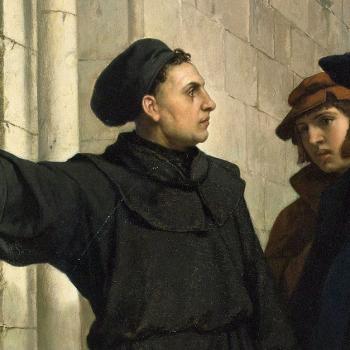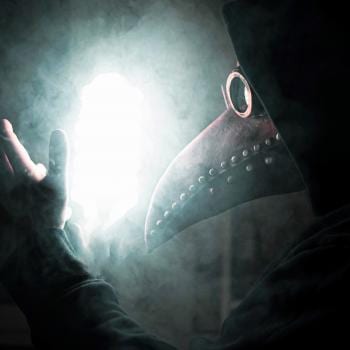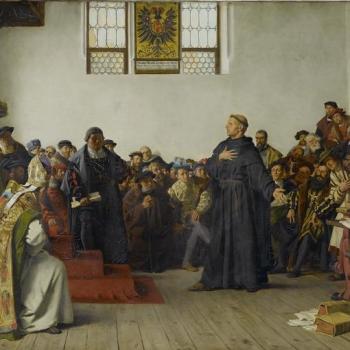As an unabashed Protestant, I have no qualms expressing the belief that the Reformation ought to be celebrated. I am settled in the conviction the split catalyzed by Luther not only shaped the course for modern Evangelicalism, but the world. While each bears a distinctive measure of theological difference in their respective traditions, Protestants and Roman Catholics share a tremendous amount in common. For example, divine simplicity, the doctrine of the Trinity, Christology, Theology Proper, much of the Doctrines of Grace, and more, is shared with Patristic and late Medieval theologians.
Election and predestination are so clearly presented in Aquinas and Augustine that for much of the dialogue over the sovereignty of God in salvation, Protestants find roots going back centuries prior to the Reformation. The simple point being that the Patristic and Medieval theologians are not removed from our tradition; they belong to us and our history traces further back than 1517. Protestants are not some rebellious mongrels without forerunners; tensions within the Catholic Church were brewing long before Luther came upon the scene.
Nepotism, sexual indulgence within the clergy, abuse of power and finances, etc., all ran rampant within the church. However, it must be noted many who remained within the Catholic Church desired reformation as well. The breaking of fellowship was not done simply due to the continual problems of sinful deviancy, but over matters of doctrine. To many modern readers, this proves particularly troubling. Many today decry the notion of splitting hairs over doctrine – yet this process of “vetting” orthodoxy and orthopraxy is foundational to the historic church. As these events invariably lead to primary matters of doctrine, this is no small occasion of mere, theological quibbles.
Stop, Hammer-Time
The breaking point between the Reformers and the Roman Catholic Church was primarily in terms of ecclesiology and authority. Only later did the issue of soteriology come into play as the logical conclusions were reached regarding one’s understanding of the relation between the authority of the church and Scripture. Luther did not initially come to grips with these conclusions until later in his life – later than the day he nailed his 95 Theses to the door.
Yet in all of the outcomes, we must recognize the palpable shame accompanying the Reformation. There are legitimate critiques that have been made against the Protestant church. Some are so bold as to suggest the pope’s warning to Luther has been recognized today – that the critical theories of the Enlightenment are a result of Luther’s “braggadocious nature and banal desire to bring the Word for even the plow-boy”.
As the argument goes, the trajectory of this world in its conquest to rid itself of God, is owing to Luther. Such an asinine idea not only deifies a man incapable of such a feat, but also betrays the reality of much of the Roman Catholic Church. Despite efforts to make it appear as such, the Roman Catholic Church is certainly not monolithic.
The Shame of the Church
Luther’s initial desire was not that the church would suffer another cataclysmic split, but that reform would happen within the church itself. Though the abuse of indulgences sparked Luther’s theses being nailed at the door in Wittenberg, the burning in his bosom was spurned by the understanding of the gospel itself. It was only later, when such a divide was inescapable, we see Luther’s more bombastic treatment upon the Pope and the Roman Catholic Church.
It is often said that for the Reformation to have happened, we needed a man of Luther’s boldness and crassness, and perhaps this is true. What seems more appropriate though are the sentiments of Luther, “I simply taught, preached, and wrote God’s Word; otherwise, I did nothing. And then, while I slept, or drank Wittenberg beer with my Philip and my Amsdorf, the Word so greatly weakened the papacy that never a prince or emperor did such damage to it. I did nothing. The Word did it all.”
This was also an incredibly controversial statement from Luther, one which ultimately brought to bear the scrutiny of Rome. The pope was not altogether incorrect in his assumption that bringing the Scriptures to every common man would result in a veritable Pandora’s Box being opened – we see this evident in the modern church. It was evident in Luther’s own day with the Zwickau prophets and the Münster Rebellion. Yet much to the chagrin of the Roman Catholic Church, theological liberalism makes no such distinction in her bedfellows. All one must do is prefix the adjectival moniker “progressive” to either term and there will be a veritable poop-mine of heretical doctrine and practice. Historically, this is also revealed.
The continual rejection of all things good and true, coupled with sexual licentiousness, provides the fodder with which an unquenchable flame destroys a civilization. How much more so the church? This is nothing remotely new or novel; this trajectory runs its course throughout the history of every society. It is true an individual man is capable of destroying humanity and turning her from her Creator – but that award belongs to Adam, not Luther.
There is much which has been written on the nature of society’s collapse into theological anarchy, yet suffice it to say, it can be summarily reduced to one key factor: Satan is the father of unbelievers. Until the light of the gospel penetrates the hardened heart of those in unbelief, we must recognize the work of our adversary who has blinded their eyes. Shall we be surprised at the societal decent into Hades when the one leading them upon the broad road is this world’s prince? Has history not been abundantly clear in revealing the wickedness of mankind?
Is the Result Indicative of Bad Fruit?
Faithful Catholics and Protestants agree on the perverse nature of our times, wherein logic is spurious, superfluous, and subjective, and sexual immorality is not only rampant, but lauded from the highest courts, to the universities, down to the common layperson. We’ve both enjoyed relative prosperity in a slowly crumbling society – yet it seems such a pace is now no longer to be had. It seems the only way to go unscathed in the West’s “sexual revolution” is to embrace it. Silence is swiftly becoming affirmation of the opposing side.
Both Roman Catholics and Protestants would fundamentally reject those of “nominal” or a “lapsed” faith as having a faith that lasts. Both would reject the tide of theological liberalism within an historic faith. Yet much to the chagrin of the church, the gospel itself has become nearly as convoluted and distorted in our current age as it did previously. There is much to be said of the “fruit” of our age, both of many legitimate Christians and the self-professed who have deluded themselves.
Many within Protestantism have no concept of fidelity to a local church. There is little agony faced by many within the Protestant church over a split; far too many feel there is no need to even be among the Body of believers and celebrate that unity. Many within Protestantism also maintain an incredibly low ecclesiology – they do not see the church possessing much, if any, authority at all.
Yet it is incredibly easy to chastise the church and pick at her open wounds. Incidentally, the mark of constant, unwarranted complaint against the church is indicative of a type of theological liberalism. This discussion then must not be approached on the outcome or trajectory of the church; it must be approached doctrinally. What is more than this is the positional authority one holds in this doctrinal approach. Again, it boils down to ecclesiology and the Divine Writ – and ultimately, soteriology. One’s understanding of how the church is to function in relation to the Scripture’s authority plays an especially pivotal role in her conception of how the Christian is saved.
This is precisely why the central divide stands over our respective understandings of the gospel itself. This is no trite disagreement worthy of overlooking for the sake of feigned ecumenism; this is no battle over semantics. The understanding of the place of works and faith in salvation and how the church is to function must shape the entire conversation, as this is precisely where the divide took place 500 years ago.
The Divide Continues
Despite efforts toward Ecumenism, the divide continues. This is a worthy divide – one lacking the capability of being overlooked or dismissed. We disagree not only on theology, but practice. To bridge this gap, one must make some serious concessions – yet to make such concessions betrays the very notion of true ecumenism. We must come to agree on the essentials whilst being able to disagree on matters of secondary importance if we are to have genuine unity. The gospel is no secondary matter and for this reason, we are not together.
It is quite clear that both sides understand the soteriological significance of this discussion. Sola Fide as a protestant distinctive is not in harmony with ecclesial teachings of the Roman Catholic Church. While the Catholic Church is as broad and diverse as some of her catechetical documents, we stand fundamentally opposed. We ought to lament this divide, for though the Catholic Church might now regard Protestants as estranged, it nonetheless stands that we are on opposing sides.
For Protestants who understand the nature of this divide, there shall be no return to the “Mother” church. For Protestants who have embraced the doctrine of faith by grace alone – there is no conceivable means by which Roman Catholic teaching is acceptable. If both sides truly know the differences, there is no means by which we can look at the other and truthfully concede they are saved. The only means this is possible is through a delightful contradiction that either dissolves the authority of the Roman Catholic church (a la Vatican II) or the authority of the Scriptures. Thus, we must understand the discussion bears eternal consequences.
A wonderful Roman Catholic friend of mine put it best as we were discussing these matters the morning of his wedding: “Well, Grayson, we both regard each other as heretics.” I replied, “Bob, I don’t necessarily believe you’re a heretic, I just think you embrace certain heresies.” We both chuckled, but it brings to bear an important fact in this discussion. Things are funny because we either stretch the expectation of reality to absurdity, or we so bluntly speak in a manner betraying the formality of social conventions, that it startles us into laughter.
Though he and I agree an incredible amount within the corpus of our respective beliefs, we nonetheless realize the very real divide in our understanding of Christ’s work and the efficacy of the sacraments. We also realize this stems from the positions we hold in the ultimate question: where does the final authority lay? Is it within the Scriptures – or within the Church?
In all of this, my expectation is that he is unabashedly Roman Catholic. I am neither offended nor surprised when he acts consistent to his beliefs. His expectation is that I am unabashedly Protestant, and he likewise draws no offense or surprise. These predispositions inform where we land. We likewise consider ourselves correct on the matter. The divide persists even in the midst of a dear friendship. The divide is over the gospel and how the grace of God effectively works out in the lives of men.
Why Celebrate the Reformation?
The world needs the gospel. The Catholic Church still needs the gospel. The Liberal Church needs the gospel. So too does the Evangelical church. The 500th anniversary of the Reformation ought to conjure in our minds a renewed fervor and discussion of that gospel. If the gospel can be “lost” in a former generation, it can surely be lost in our own. The sweeping biblical illiteracy coupled with the tides of modern progressivism, has decimated much of any understanding of the nature of the grace of our Lord.
It would seem we are at that pivotal breaking point in humanity’s history once again. Higher education, civil authorities, and general citizens alike, reject nearly every sense of moral decency. The pervasiveness of the sexual ethic (or lack thereof) as a metaphysical identity ought to testify to the unbridled decadence of our age. Not only does one see this perversion within every sphere of secular society, but within formal, Christian entities. That is, within the supposed Christian university; the supposed Christian, local church; the supposed professing believer.
Perhaps it is through the fires of adversity that we might finally rekindle an affection for the true gospel to be proclaimed boldly in the streets. Perhaps it is through the mouth of a bombastic rascal this world might be shaken to its core and convicted of its wickedness before an altogether holy and judicious God. Would we not rather let them be smote with harsh words than consumed in eternal hell-fire where they shall weep and gnash their teeth forevermore?
We shall provide no grand, ecumenical, Christ-honoring influence, if we shan’t come to agree on the essential nature of the gospel itself. It would seem the writing is on the wall with regard to the next, great schism between the progressive and conservative church (though my personal sentiment is this happened long ago). In each of these examples one finds the positional authority figure at play.
The ultimate question, then, is where final authority lay. Is it the pope and bishopric as Roman Catholics suggest? Is it the sentiments of the glass-slippers generation, as theological liberals suggest? Or is it Scripture? Each of our respective camps places authority within the church and Scripture to some degree, yet only one places themselves under the final authority of the text.
Despite the bleak depiction above, it would seem that so long as the Lord tarries and the reader has breath, ecumenism may happen. If Luther’s initial intent was for reformation to happen within the church rather than result in schism, perhaps some measure of mending could take place if the Lord were pleased to see it through. To be sure, we ought to mourn over the fact that such a divide has happened – yet rejoice in the fact that reformation can happen in and through the pure gospel of Jesus Christ. If that pure, unadulterated gospel can be brought forth to shine in the darkness once again, we might yet see genuine reformation. We rejoice, therefore, because of the hope we have in God effectually doing His work.
There are at least three things the Reformation always reminds me of:
- The gospel and His Kingdom will always prevail. Our God reigns and truth never loses, even if the lie has traveled the globe several times before truth has laced her boots.
- Drastic change takes time, but sometimes the Band-Aid needs to be ripped off swiftly. Let the consequences be what they may.
- Though everything around may seem like peril – God has orchestrated everything for His glory, and I must be content in knowing He loves His name’s sake infinitely more than I can even dream of.
The Reformation is always worth celebrating. Semper Reformanda.
Other Articles In This Series:
- Reformation 500: Sola Fide and The Roman Catholic Church
- Reformation 500: Sola Fide and The Historic Protestant View
- Reformation 500: Sola Gratia to a World That Needs It
- Reformation 500: Sola Fide, The Apostle Paul and Romans 3-4
- Reformation 500: Is Sola Scriptura a Blueprint for Anarchy?
- Reformation 500: Should the Reformation be Celebrated or Lamented?












